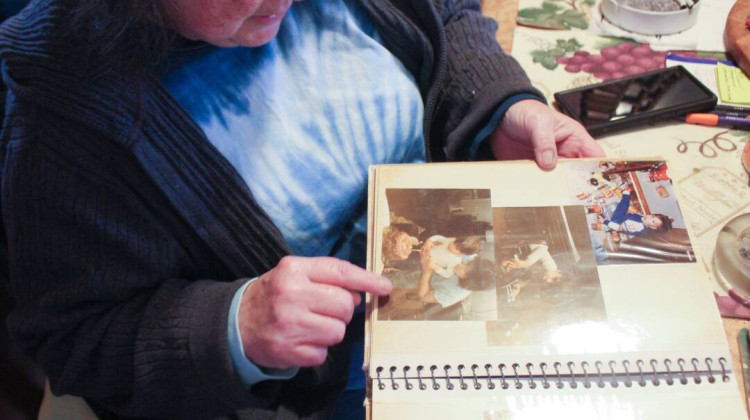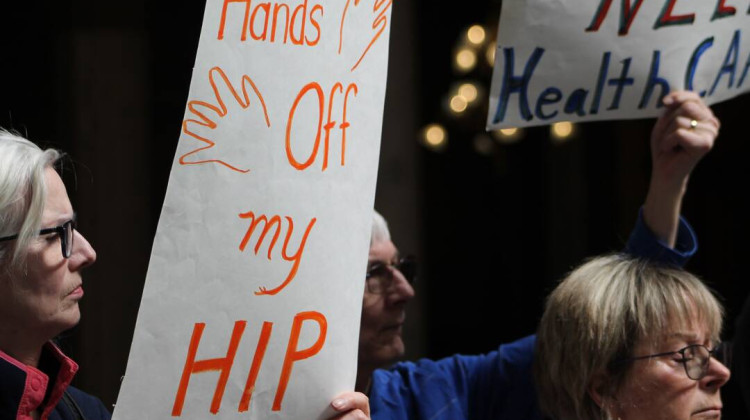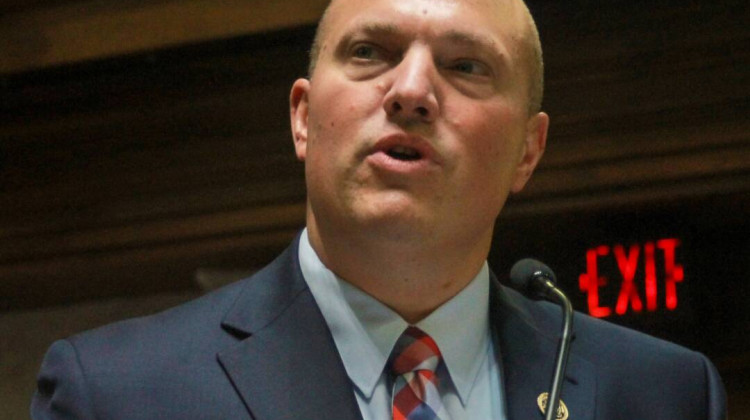
Signs like this one have popped up across Indianapolis. It reads: "Thank you to the essential. Our community stays home for you."
Lauren Chapman/IPB NewsThe Indiana State Department of Health reported 17 additional confirmed deaths since Tuesday, bringing the state’s total to 2,394. The state announced more than 43,000 total confirmed cases, with more than 444,000 Hoosiers tested.
Some Hoosiers Might Get Help From New Rental Assistance Program
Thousands of Hoosier renters facing eviction in the coming weeks might get a little help from the state.
Officials announced the creation of a Rental Assistance Program Wednesday. It will provide $500 a month for four months to people who’ve lost income during the pandemic.
Indiana Housing and Community Development Authority Director Jacob Sipe noted that won’t cover full rent.
“In Indiana, the median rent is $825," Sipe said. So, it’s important that the household continue to work with their landlords to make a payment plan to make those payments.”
Landlords have to agree to participate in the program for Hoosiers to get help. Asked what people should do if their landlords won’t participate, Sipe only urged renters to talk with their landlords.
Advocates Say Indiana Rental Assistance Program Is Good Start, Falls Short Of Need
Indiana housing advocates say the state’s new Rental Assistance Program sets up the “pipeline” to help Hoosiers in need – but that it still needs to be filled with resources.
The state says its effort will help 12,000 households pay rent.
Join the conversation and sign up for the Indiana 2020 Two-Way. Text "elections" to 73224. Your comments and questions in response to our weekly text help us find the answers you need on COVID-19 and the 2020 election.
The Hoosier Housing Needs Coalition estimates the new program would still leave around 200,000 households without help.
But the coalition’s Andrew Bradley said the program is a good start – and its early results should help guide the state moving forward.
“Have we provided enough resources and have we targeted those resources to the families who need them the most?” Bradley said.
The program requires landlords to participate in order for Hoosiers to get assistance. Bradley said that’s not a bad thing.
Purdue University, Microsoft Partner To Create Free Online Farmers Market
Farmers around Indiana have faced challenges marketing their products to potential buyers, and the coronavirus pandemic made the problem worse. A joint effort between Purdue University and Microsoft will help connect local farmers directly to customers online.
The Hoosier Food Market is an online platform for Indiana farmers to list their produce for sale.
Rather than charging the farmers to participate in the online market, the website will act as a bridge connecting farmers to people and help compliment in-person farmers markets.
“So let's say I'm a consumer and I want to find who sells tomatoes in Indiana,” said Ariana Torres, Purdue University professor and project co-leader. “I'm able to go to that website and find the vendors and pay for it and probably get delivery to my house.”
She said the new market will help farmers be more efficient and help maintain local economies that have already been hurt by COVID-19.
Meatpacking Union Calls For Increased Pay And National Company Virus Registry
A labor union that represents meatpacking, grocery and health workers in Indiana is calling for hazard pay and mask requirements at work. It’s part of a broader effort to enforce national workplace health and safety standards amid the pandemic.
The United Food and Commercial Workers union held an online news conference calling for increased pay and safety requirements to be enforced. It would also like for larger companies to put data on workers affected by COVID-19 on a national public registry.
Dennis Medbourn works at the Tyson Foods plant in Logansport. He said despite mandatory mask wearing and plexiglass barriers, he was one of the roughly 900 workers there who tested positive for the virus.
Is Indiana Ready For A Disaster During The Pandemic?
Flooding devastated homes and farms in Indiana last year. The ongoing effects of the pandemic could strain Indiana’s ability to respond to disasters like floods, tornadoes or extreme heat.
Nicolette Louissaint is the executive director of Healthcare Ready — a national nonprofit that coordinates healthcare supply chains. She said just like the 2017 hurricane season, every federal disaster agency is responding to the current crisis.
But with COVID-19, so are local and state agencies — and they often don’t have as many resources.
“They’re going into budgets that should be prepared for natural disasters already. So they are already stretched in ways both financially and from a personnel perspective,” Louissaint said.
Louissaint said there may also be fewer emergency contractors and volunteers available for fear of catching COVID-19. That could be an issue in places that don’t have good internet access.
Marion County Schools To Open Classrooms Full-time For Students In Fall
Marion County's 11 public school districts will open full-time for in class instruction on their previous scheduled start dates for the 2020-21 academic year.
District superintendents, in a joint statement, said they will offer "instructional options in either the physical school setting or online for students who are not able or are uncomfortable returning to school.”
The superintendents said more details will be released in July based on input from Mayor Joe Hogsett and Marion County Health Director Dr. Virginia Caine. That includes procedures for symptom screening, social distancing, bus transportation and facial coverings.
Caine is waiting for the county to reach Stage 5 of reopening, anticipated to happen sometime next month. Last week Marion County began Stage 4, which allows full capacity for retail businesses and offices.
Earlier this month the state released guidelines schools should consider when reopening, including changing the length and timing of school breaks, classroom layouts and following CDC guidance that people in schools should wear masks.
Recess, Gym Class And Coronavirus: How Will Recreation At Schools Be Different This Fall?
The short answer is there may be no recess or gym classes. And, if there is, it will look different.
Face masks, staggered start times, smaller class sizes, playground closures have all been addressed in a 38-page document released earlier this month by the Indiana Department of Education for schools preparing to reopen during the current pandemic.
The report details measures for school leaders to consider but does not mandate any policy change. Schools can reopen in July or August. Most school districts have said they are planning to reopen their facility for the 2020-21 school year as scheduled.
First and foremost, schools are trying to find creative ways to implement social distancing.
Suggestions include year-round schooling with alternating breaks to minimize the number of students in the building at any time, or scheduling students to attend in-person school on alternate days or half days to minimize the number of students in the building. Another approach is to continue to offer both in-person and remote instruction.
The state is recommending schools close cafeterias and playgrounds, and limit times in the hallways. Students would be served bagged or boxed meals and eat at their desks instead of eating together in the cafeteria. Bathroom breaks would also be scheduled to eliminate crowding.
Contact Lauren at lchapman@wfyi.org or follow her on Twitter at @laurenechapman_.
 DONATE
DONATE






 Support WFYI. We can't do it without you.
Support WFYI. We can't do it without you.